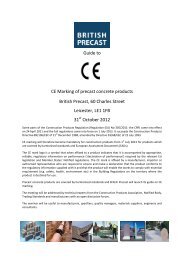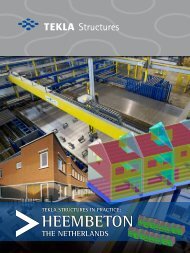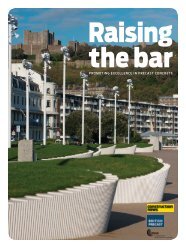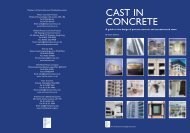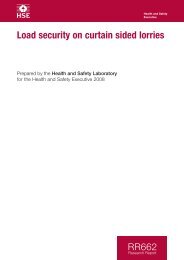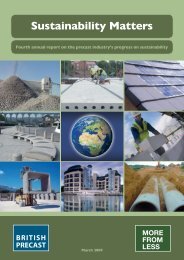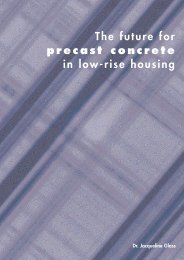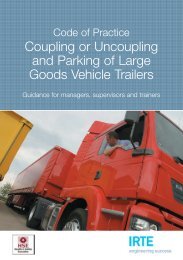The voice of concrete products - British Precast
The voice of concrete products - British Precast
The voice of concrete products - British Precast
Create successful ePaper yourself
Turn your PDF publications into a flip-book with our unique Google optimized e-Paper software.
BRITISH PRECAST BEST PRACTICE AWARDS 2008<br />
Sustainability<br />
Award:<br />
Corporate<br />
Category<br />
“<strong>The</strong> bags are<br />
supplied in flatpacked<br />
form,<br />
which allows<br />
them to be located<br />
on-site close to<br />
the point where<br />
the block waste is<br />
produced…saving<br />
time and leading<br />
to clean waste<br />
that is ideal for<br />
recycling.”<br />
Tarmac Topblock – Take Back Scheme:<br />
Tackling waste demands give and take<br />
While there is a general recognition<br />
<strong>of</strong> the need to create less waste, the<br />
drivers for construction companies<br />
become ever more tangible. This<br />
article looks at the UK’s first national<br />
block-recycling scheme and its clear<br />
sustainability benefits for both customer<br />
and supplier.<br />
Trevor Grounds, Tarmac Building Products<br />
<strong>The</strong> UK faces a major challenge to manage waste and<br />
the construction industry as a contributing sector has a<br />
huge responsibility to support national targets.<br />
Construction and demolition is the single largest user<br />
<strong>of</strong> material resources in the economy and accounts for<br />
around 33% <strong>of</strong> controlled waste in the UK (over 100 million<br />
tonnes a year), making it the single largest stream.<br />
Although around half <strong>of</strong> the 90 million tonnes <strong>of</strong> inert<br />
waste within this figure is recycled as aggregates, there is<br />
still a need to do more.<br />
During 2008, Government has rightly set tough waste<br />
targets for our industry. In June, the Government and the<br />
Strategic Forum for Construction published their joint<br />
Strategy for Sustainable Construction (1) , which includes<br />
the challenging target <strong>of</strong> 50% reduction <strong>of</strong> construction,<br />
demolition and excavation waste to landfill by 2012<br />
compared to 2008 levels. Site Waste Management Plans<br />
(SWMPs), which became compulsory in April this year<br />
for all projects over £300,000, have set-out a practical<br />
mechanism for contractors to manage waste effectively.<br />
A SWMP is also a mandatory element <strong>of</strong> the Code for<br />
Sustainable Homes.<br />
In the near future, sending waste to landfill will come<br />
at an even higher price, thanks to the landfill tax where the<br />
standard rate for non-inert material is due to hit £48/tonne<br />
in 2010–11.<br />
Add these potentially crippling waste disposal costs to<br />
the rising price <strong>of</strong> raw materials and the business case for<br />
recycling <strong>products</strong> in order to conserve energy and virgin<br />
aggregates becomes even more compelling.<br />
Recognising the inherent recyclability <strong>of</strong> <strong>concrete</strong>, a<br />
group <strong>of</strong> Tarmac employees within its <strong>concrete</strong> block division,<br />
Topblock, identified a way to help both customers<br />
and the company meet the need to reduce waste and use<br />
materials more effectively by proposing a site collection<br />
scheme for unused and <strong>of</strong>fcut product.<br />
In 2007, the Tarmac Topblock Take Back Scheme was<br />
launched in partnership with HIPPOWASTE, the national<br />
provider <strong>of</strong> innovative and integrated waste management<br />
solutions. <strong>The</strong> scheme ensures that Topblock customers,<br />
such as national and regional housebuilders can take<br />
advantage <strong>of</strong> a nationwide service to remove and recycle<br />
their block waste.<br />
Customers purchase labelled 1m 3 HIPPOBAGS into<br />
which broken and <strong>of</strong>f-cut blocks on site can be segregated<br />
(cost penalties are included to discourage indiscriminate<br />
use <strong>of</strong> the bags for non-segregated materials).<br />
<strong>The</strong> bags are supplied in flat-packed form, which<br />
allows them to be located on-site close to the point where<br />
the block waste is produced. This encourages direct segregation<br />
at the point <strong>of</strong> production, saving time and leading<br />
to clean waste, which is ideal for recycling.<br />
When ten or more bags are full, HIPPOWASTE collects<br />
and transfers them to either a recycling facility operated<br />
by Tarmac Recycling Limited (TRL) or an appropriate<br />
Topblock plant – which minimises journeys and reduces<br />
carbon emissions. <strong>The</strong> recycled aggregates produced by<br />
Figure 1: <strong>The</strong> Take Back<br />
Scheme was launched<br />
in partnership with<br />
waste management<br />
firm HIPPOWASTE.<br />
16<br />
Reproduced f ro m CONCRETE December 2008/January 2009 © <strong>The</strong> Concrete So c i e t y, 2008



